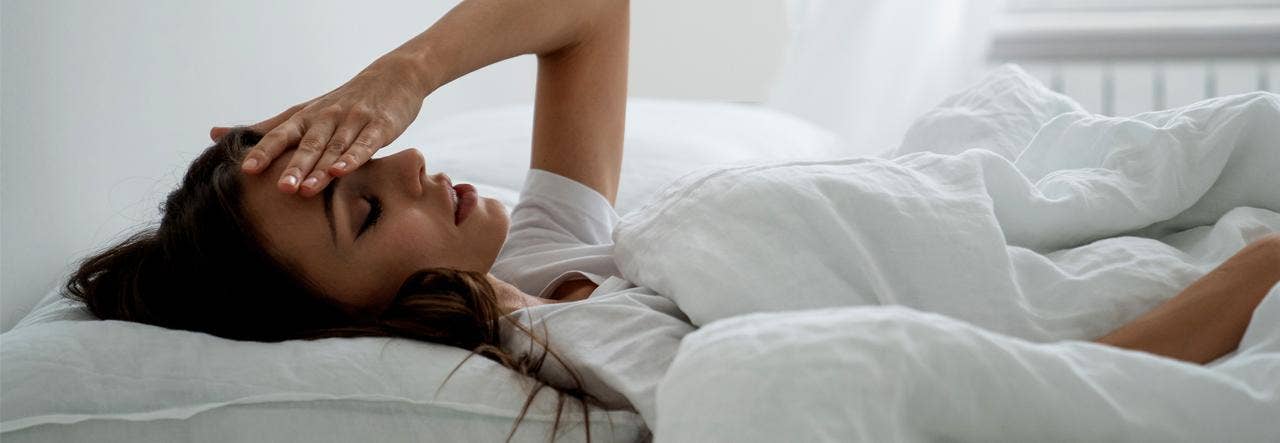OK, this could be a very short blog post because, of course, the answer is yes – lack of sleep affects your mental health. That’s right about on par with saying vegetables are good for you! Or, exercise is important. We learned this stuff in preschool, right?
What matters in terms of mental health and sleep is deeper than that. Does sleep deprivation actually cause mental health disorders? Or, are sleep issues an unhealthy, unfortunate symptom of them?
Can both things be true?
Again, short answer: yes. But you won’t find an easy answer to the question of what came first – the sleepless nights or the sometimes debilitating mental health struggles. Insomnia and other sleep issues can be both a cause and a symptom of mental health disorders.
For example, three-quarters of people who suffer from depression report sleep problems. And … people diagnosed with insomnia are ten times likelier to have depression. So, that whole “chicken or egg” line of thinking is really more of an “and” than an “or.”
The reality is that mental health and sleep have a bidirectional relationship, meaning that both wield immense power to impact the other. It’s also true that there is a significant difference between a few bad nights spent worrying about a new job and a legitimate sleep disorder. Just like there’s a difference between normal stress and clinical depression, anxiety and other mental health disorders.
First Things First: What Qualifies as Sleep Deprivation?
Who among us hasn’t tanked our sleep with a late-night YouTube wormhole or Netflix marathon? Not to mention parents with babies who fight sleep. Although most of us know that adults need seven to nine hours a sleep a night, work and life can often get in the way.
Technically, the term “sleep deprivation” simply refers to any time a person fails to get enough sleep. Even a short stretch of poor sleep can negatively affect your body, as well as your:
- Mood
- Attention
- Concentration
- Memory
- Motivation
Poor Sleep vs. Sleep Disorders
When not prioritizing sleep shifts into not being able to fall or stay asleep, you may be dealing with a sleep disorder just like 70 million other Americans. These can have more serious, long-term effects on your physical and mental health. Some the most common sleep disorders include:
- Insomnia
- Narcolepsy
- Sleep apnea
- Restless leg syndrome
The Rundown: Sleep and Mental Health Disorders
Whether you’re having an off week in terms of sleep or struggling with a more substantial sleep issue, the reality is that your sleep deprivation could be either triggering or exacerbating a mental health condition.
Sleep and Depression
Depressive disorders – characterized by persistent feelings of sadness, hopelessness, loss of motivation, irritability – have a close tie to sleep, energy and the ability to focus. In fact, trouble sleeping is a hallmark symptom that clinicians look for when making a diagnosis. Insomnia and sleep apnea both commonly overlap with depression diagnoses. And, back to that bidirectional aspect, people with insomnia are at a higher risk of developing depression.
Sleep and Anxiety
Anxiety is the most common mental health disorder in the U.S. and it can have a wide range of presentations – everything from anger to nausea to racing thoughts and a sense of impending doom. The irrational or intrusive thoughts associated with many anxiety disorders (generalized anxiety, OCD, PTSD, etc.) can cause a state of mental hyperarousal, which essentially just means your brain can’t relax. So it’s not a surprise that insomnia is often associated with anxiety.
Sleep deprivation can greatly impair the ability to cope existing anxiety issues. So much so that there is even a condition called sleep anxiety. This is when that fear of not being able to sleep actually stops you from being able to sleep. Brutal.
Sleep and Bipolar Disorder
People who suffer from bipolar disorder experience alternating periods of depressed and manic states. Unfortunately, this lends itself well to sleep disturbances – everything from insomnia to excessive sleep. Lack of sleep or changes in the normal sleep cycle can even trigger manic phases.
Can You Improve Sleep to Improve Mental Health?
Well-meaning friends and family may tell you, “Get some rest. Everything feels better in the morning.” And, while they’re not wrong, it’s also not that simple. Anyone suffering from depression, anxiety or other mental health disorders should speak with a trained healthcare professional. Same goes for those struggling with chronic sleep disorders. Cognitive behavioral therapy has been incredibly helpful for many people in both instances.
Natural Coping Tips for Better Sleep


In the meantime, the bidirectional relationship between sleep and mental health does indicate that improving one can improve the other. There are a lot of simple, natural ways you can try to start getting better sleep right now, including:
- Getting more natural sunlight
- Getting more exercise (including yoga for sleep!)
- Turning off screens an hour before bed
- Meditating
- Consuming caffeine responsibly
- Limiting naps to short power naps
Sleep and mental health go hand in hand and both require some intention. You can find more tips for sleeping with anxiety here.
 BABY
BABY  KIDS
KIDS  ADULT
ADULT  LEARN
LEARN  STORES
STORES 